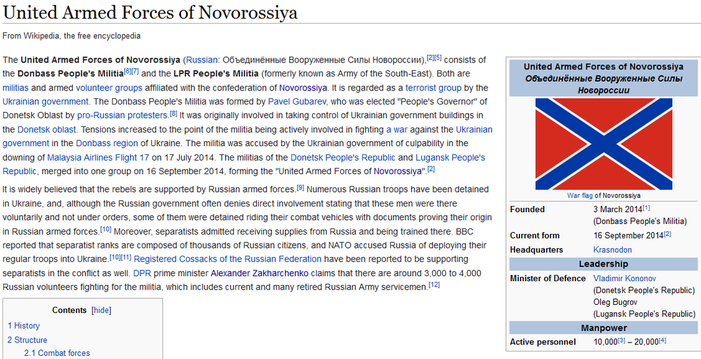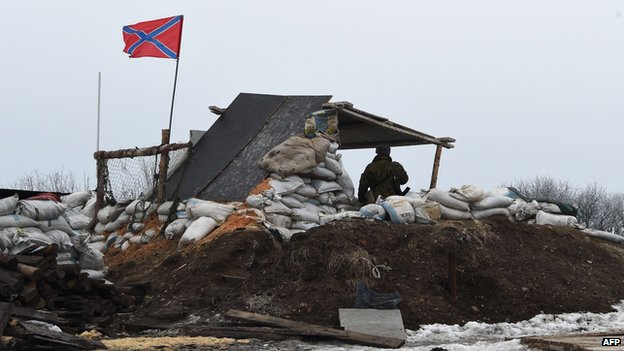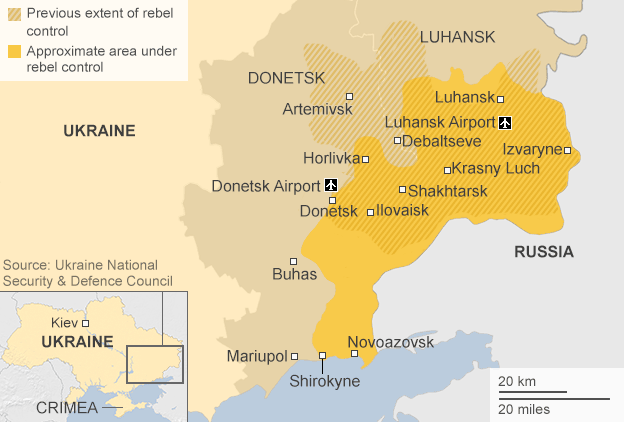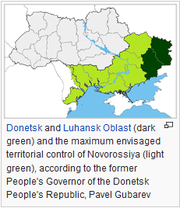Later in 2014, Russians in East Ukraine declared their intent to secede from the New Ukraine and form a new nation called Novorossiya, presumably to be a Russian satellite. Militias appeared and a secessionist war drags along which has killed thousands already. This sort of war was predicted by a professor I had in a class about the “Soviet Succession States” in my final semester at university in 2008. He was in no way pro-Russian but he said the obvious solution was to rearrange borders in line with ethnic geographies, and that refusing to consider doing so was deeply foolish. The main example he used at the time was Ukraine, with its Russian-speaking majorities in many eastern areas.
I saw the BBC run a photo today of a position held by the secessionists in East Ukraine. The flag jumps out at me:
The flag bears a strong, striking resemblance to that of the Confederate States of America’s battle flag.[5][6] […] Gubarev has since stated that the inspiration for the flag came from “banners used by Cossacks who reclaimed the New Russian territories from Tatars and Turks for Russia in the 18th century”; however according to Alexey Eremenko of the Moscow Times, no Cossacks ever used a flag resembling the one chosen.[7]

The wavers of a very similar flag likewise did well in Virginia in 1861-64, famously defeating campaign after campaign by superior forces. This reminds me of a satirical song written in 1863 or 1864 called “Richmond is Hard Road”. The song was actually written by a Confederate but its narrator is supposed to be a Union soldier looking back on the six straight debacle-like failures to move against Richmond):
Richmond is a Hard Road to Travel
Of the famous “On to Richmond” double trouble,
Of a half a dozen trips and half a dozen slips
And the very latest bursting of the bubble.
‘Tis pretty hard to sing and like a rolling ring
‘Tis a dreadful knotty puzzle to unravel.
Though all the papers swore, when we touched Virginia’s shore,
That Richmond was a hard road to travel! First McDowell, bold and gay, set forth the shortest way
By Manassas in the pleasant summer weather,
But he unfortunately ran on a Stonewall, foolish man!
And had a rocky journey altogether. […]
It was clear beyond a doubt that he didn’t like the route,
And the second time would have to try another!
I find this song to be very clever. The last two lines there pun cleverly: “Route” (as in path) is pronounced by the singer as rawt, the same as “rout” (as in, a military defeat resulting in the temporary disintegration one an army and its retreat from a battlefield). There were two battles of Manassas, summer ’61 and summer ’62, both failures for the Union. Many of the other puns of this song require knowledge of the U.S. Civil War of more depth even than that, and I don’t get many of them.
Here is a performance of this song by the “2nd South Carolina String Band” (Lyrics):



